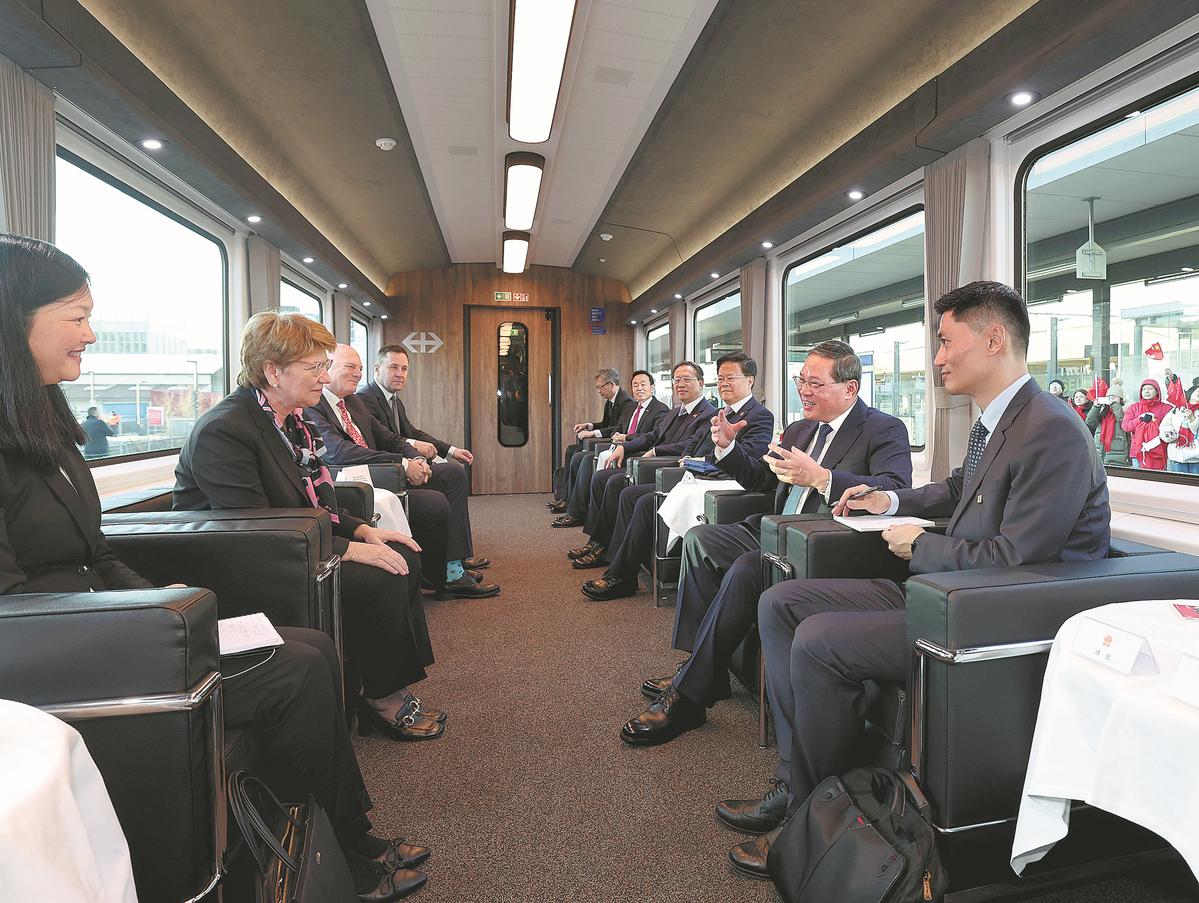
 0 Comment(s)
0 Comment(s) Print
Print E-mail China Daily, January 16, 2024
E-mail China Daily, January 16, 2024

Premier Li Qiang (second from right) talks with President of the Swiss Confederation Viola Amherd (second from left) on Sunday on a special train from Zurich to Bern, the capital of Switzerland. [Photo/Xinhua]
China and Switzerland announced on Monday the completion of a joint feasibility study on the upgrade of their free trade agreement and agreed to support the prompt launch of formal negotiations.
The announcement was made during Premier Li Qiang's official visit to the European country. Li held talks on Monday with President of the Swiss Confederation Viola Amherd in Bern, the Swiss capital.
Both sides also agreed to hold a new round of strategic dialogue at the foreign ministerial level as well as meetings of the financial working group, energy working group, education policy dialogue and consultations on United Nations Security Council affairs within this year, according to a statement released after the meeting.
China will grant Switzerland unilateral visa-free treatment, while Switzerland said it will provide greater visa convenience for Chinese nationals and Chinese enterprises investing in the country, the statement said.
During the talks, Li said that both sides should explore more areas of shared interests, strengthen cooperation in areas such as free trade and customs, and nurture and expand new growth drivers of cooperation in green development, finance and the digital economy, thus upgrading bilateral economic and trade cooperation.
The premier expressed his hope that Switzerland will continue to provide an open, fair and nondiscriminatory business environment for Chinese enterprises in Switzerland.
Both sides should also enhance communication and coordination within multilateral mechanisms such as the UN, strengthen cooperation in areas such as financing for interconnectivity of infrastructure, international development assistance and climate change, and jointly make positive contributions to world peace and development, he said.
Amherd said that Switzerland is willing to work with China to promote high-quality bilateral dialogue.
Switzerland is ready to work with China to jointly address global challenges such as climate change, public health and cybersecurity, and achieve greater development in the Switzerland-China strategic partnership featuring innovation in the new year, she said.
The two leaders witnessed the signing of a document on bilateral economic and trade cooperation after their talks.
Switzerland is China's sixth-largest trading partner in Europe, and China is Switzerland's largest trading partner in Asia. In 2022, trade between the two countries reached $57.33 billion. From January to August 2023, their bilateral trade stood at $40.86 billion, up 15.7 percent year-on-year.
In July 2013, China and Switzerland signed a comprehensive free trade agreement, which waived most tariffs on goods and took effect in July 2014, making Switzerland the first continental European country to conclude and implement a free trade agreement with China.
The two countries agreed to upgrade their free trade agreement as both countries expressed opposition to protectionism during President Xi Jinping's state visit to Switzerland in 2017.
Juerg Burri, the Swiss ambassador to China, said that Sino-Swiss relations are based on trust in the sense that Switzerland was one of the first Western countries to establish diplomatic relations with China.
China's first industrial joint venture with a Western company was with a Swiss company and the first free trade agreement with a Western European country was with Switzerland, Burri said in an interview with China Global Television Network.
"And all that shows that the partnership between Switzerland and China is really something which is a pioneering partnership," he said, adding that the free trade agreement has proved beneficial to both nations and calling for the further development of bilateral relations.
He said there are more than 700 Swiss companies in China. "They're very innovative companies, and they benefit a lot from the very qualified and very motivated Chinese workforce. And they have brought Swiss innovations into Chinese manufacturing, Chinese pharmaceuticals, and so on. This is really a success story where you can see that both economies correlate and help each other."
"In other fields, such as finance or foreign affairs, we have a lively dialogue, and I think it's a good moment to make a plan for the future."